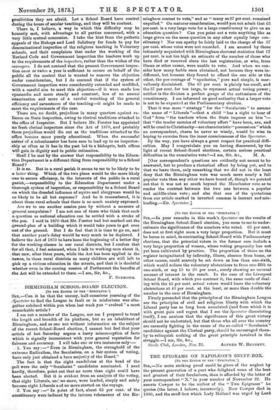BIRMINGHAM SCHOOL-BOARD ELECTION.
[TO THE EDITOR OF THE " SPEOTATOR."] Slit,—Can it be that the uneasy, half-conscious yearning of the Spectator to find the League in fault or in misfortune was alto- gether subdued within you when last week you " evolved " a moat remarkable article ?
I am not a member of the League, nor am I prepared to tread the length and breadth of its platform, but as an inhabitant of Birmingham, and as one not without information on the subject -of the recent School-Board eleCtion, I cannot but feel that your article of last Saturday argues a hasty misconception of facts which is signally inconsistent with your general reputation for 'fairness and accuracy. I will take one or two instances only:- 1. You say :—" Even in Birmingham, the stronghold of the -extreme Radicalism, the Secularists, on a fair system of voting, have only just obtained a bare majority of the Board."
The fact is that the eight candidates at the head of the poll were the only "Secularist" candidates nominated. I need hardly, therefore, point out that no more than eight could have been elected. But it .is evident from an analysis of the voting, that eight Liberals, and no more, were landed, simply and solely because eight Liberals and no more started on the voyage.
2. You say :—" In point of fact, about 63 per cent. of the constituency were induced by the intense vehemence of the Bir- mingham contest to vote," and as " many as 37 per cent. remained unpolled." On maturer consideration, would you not admit that 63 per cent. is a very large vote for a large constituency to give on an education question? Can you point out a vote anything like as large given on the same question in any other equally large con- stituency? Nor can apathy be fairly laid to the charge of the 37 per cent. whose votes were not recorded. I am assured by those intimately acquainted with Birmingham electoral statistics that 17 per cent. is not too high an estimate of the number of those who have died or removed since the last registration, or who, from illness or other causes, were unable to vote. And when we con- sider how many feeble ones abstained, not because they were in- different, but because they feared to offend the one side or the other, the per-centage of " apathetica," pure and simple, is mar- vellously diminished. The 63 per cent. is plainly too small, and the 37 per cent. far too large, to represent actual voting power ; neither is the division a perfect gauge of the enthusiasm of the constituency. I am informed on good authority that a larger vote is not to be expected at the Parliamentary election.
That it was mere " strategy " for the " Secularists " to assume the name of " Liberals "—that a child " has a right to hear of God" from "the teachers whom the State imposes on him "- that "the tender mercies of voluntary effort" have been, are, and will be cruel to Christianity—are characteristic" possessions" which no correspondent, charm he never so wisely, would be wise in hoping to exorcise from the inner consciousness of the Spectator.
By the way, you have always a great respect for practical diffi- culties. May I congratulate you on having discovered, by the light of recent School-Board elections, certain serious practical
difficulties in the cumulative vote?—I am, Sir, Ste., M. A.
[Our correspondent's questions are evidently not meant to be answered, but to prodace a rhetorical effect by being put, and to that we leave them, only remarking that we did not in the least deny that the Birmingham vote was much more nearly a full popular vote than any other we have heard of, though we pointed out that it was not so much beyond the Manchester vote as to render the contrast between the two one between a popular and middle-class vote ; and also that one of the quotations from our article marked in inverted commas is inexact and mis- leading.—En. Spectator.]






































 Previous page
Previous page